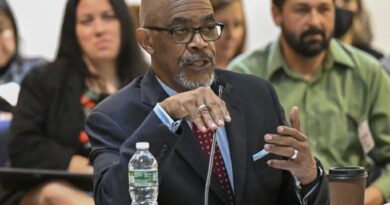Hochul submits to nursing union’s $12 billion senior-care power move

Governor Hochul recently made significant changes to the Consumer Directed Personal Assistance Program, selecting a Georgia-based company as the program’s new statewide fiscal intermediary. This move will replace hundreds of smaller companies currently involved in these responsibilities.
Despite this announcement, there has been backlash from consumers, providers, and disability rights advocates who believe that this shift will jeopardize crucial services for CDPAP clients.
Interestingly, George Gresham, president of 1199 SEIU, a prominent health-care union, praised Governor Hochul’s decision, showcasing the union’s support for the controversial plan.
It is evident that the union’s interest lies in the potential for unionizing hundreds of thousands of CDPAP caregivers, leading to an increase in both membership and revenue.
However, Governor Hochul’s rationale for these changes remains complex.
While she and her budget advisors have expressed concerns about the program’s rapid growth, citing downsizing as a cost-containment strategy, inviting a unionization drive could result in higher spending.
If Governor Hochul continues on this conflicting path, CDPAP could face challenges similar to its previous bureaucratic issues.
The Consumer Directed Personal Assistance Program serves as an alternative to traditional home care, allowing recipients to hire, train, and manage caregivers of their choice, including family and friends. Medicaid covers the caregivers’ wages in this arrangement.
CDPAP has experienced significant growth over the past decade, with enrollment numbers skyrocketing from 12,000 to over 250,000 between 2015 and 2023. This surge has led to annual Medicaid expenditures exceeding $12 billion.
New York’s higher rates of spending on Medicaid personal care and home health employment can be partially attributed to CDPAP’s expansion. The presence of numerous fiscal intermediaries, tasked with administrative duties in exchange for fees, has contributed to the program’s growth.
Efforts to reduce the number of these companies in the past faced obstacles, but the recent move to consolidate the program under a single fiscal intermediary gained traction during this year’s budget negotiations.
While there is criticism and opposition surrounding the consolidation of CDPAP, with multiple lawsuits and legislative resistance, the transition is set to be complete by April 1, 2025, when existing fiscal intermediaries will no longer conduct business with the state.
Public Partnerships LLC, the winning bidder, must now finalize contracts with the Health Department and negotiate subcontracts with over 30 existing fiscal intermediaries. This entails re-enrolling 250,000 program recipients and their caregivers, which poses logistical challenges.
Despite the absence of a formal role for 1199 in the transition process, the union’s involvement is expected to continue. Senate Health Chairman Gustavo Rivera has introduced a bill repealing the plan, indicating widespread opposition.
Manhattan state Sen. Brad Hoylman-Sigal expressed his support for the CDPAP changes, hinting at collaboration with @1199SEIU to ensure the plan’s success.
Adapted from the Empire Center blog.



